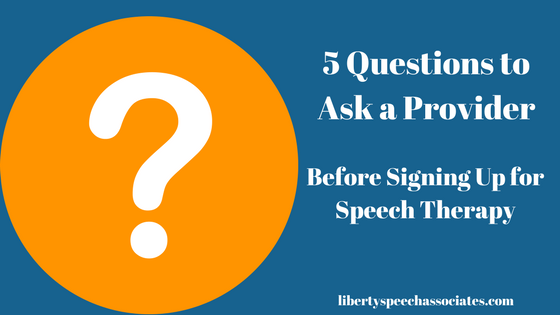
Question 1 – Are you licensed?
In most states, including NJ, a speech-language pathology license is required to practice as a speech-language pathologist (SLP). Refer to the ASHA website for specifics on what licensing (if any) your state requires. Although SLPs should be the ones providing speech therapy, there are non-SLP providers out there selling their services with claims that they are doing “speech therapy.” Unfortunately, these individuals typically don’t have a licensing board/governing body to control their practices nor do they have the background to provide sound speech and language treatments. Therefore, this question should be at the top of your list when looking to begin speech therapy.
Question 2 – Are you ASHA-certified?
While certification is not required to practice as an SLP, ASHA-certified providers are required to complete a minimum of 30 continuing education/professional development hours every 3 years to ensure that they are providing the best practice.
Question 3 – What are your areas of expertise?
Although all SLPs have the same general background on speech and language disorders, not all SLPs have the same areas or levels of expertise. Some SLPs may specialize in working with adults, while others only work with children. Some SLPs may have an extensive background in dysphagia (swallowing disorder), while others may be stuttering specialists. Not all SLPs are the right fit for you and your family.
Question 4 – Do you keep current with the research in your field? How so?
It might seem obvious that all SLPs or healthcare professionals would keep current with the research in their field, but this, unfortunately, is not always the case. There are SLPs (and other healthcare professionals) out there who don’t take the time to read peer-reviewed research articles regarding the current status of different evaluation and treatment methods. While it can be costly and time-consuming to stay in the loop of current best and evidence-based practices, it’s crucial for SLPs to do so to provide the most appropriate services for their clients. Would you prefer an SLP who frequently reads research and is continuously trying to expand his/her knowledge or one who hasn’t opened a speech-language pathology journal since s/he graduated from school a number of years ago?
As SLPs, we are required to complete continuing education hours (as mentioned above for the ASHA certification question); however, in taking these courses, there is still no guarantee that the information disseminated has been thoroughly researched or vetted. That’s to say that an SLP could be doing many hours of continuing education, but on topics that have never truly been studied.
Question 5 – Have you worked with a client with _________ diagnosis recently?
This question is similar to the expertise one mentioned above and, probably goes without saying, but if you or your loved one have a specific diagnosis (e.g., Parkinson’s Disease, Autism Spectrum Disorder, Down Syndrome) for which you are seeking speech therapy services, it’s important that the SLP you select has experience with and has recently worked with this population. Selecting an SLP who has only worked with one Parkinson’s patient in the span of 10 years would probably not be your best bet if you or your loved one has Parkinson’s Disease.

